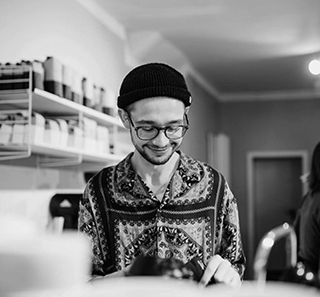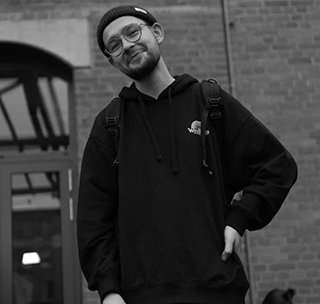Mikolaj Pociecha: Coffee Insurrection Hero Chapter #73
Published by Tanya in Coffee Insurrection Hero · 10 June 2023
Tags: Barista, Coffee_Interview, Specialty_Coffee, Poland, Gdansk, Canephora
Tags: Barista, Coffee_Interview, Specialty_Coffee, Poland, Gdansk, Canephora
1- Introduce yourself: who are you, where are you from, where do you work and what’s your job.
My name is Mikolaj Pociecha. I was born in the harbour city of Gdansk, Poland and raised on the north-west coast of Ireland. For the past few years I have lived in Tübingen, southern Germany and just this weekend I relocated to Amsterdam. Here I have joined the Back To Black team as Head Roaster. Apart from that I write on topics related to the coffee industry. My most recent book was about reimagining Canephora in context of specialty coffee. I sometimes also consult roasters and importers on roasting this particular species.
2- When and why did coffee become important to you?
Coffee became a big part of my everyday while in University (2016). Going to cafes was a pleasant part of days otherwise spent in lecture halls. Studying in Dublin provided plenty of opportunities to encounter people very passionate about coffee. I have fond memories of visiting 3fe and Kaph whose teams always shared insights into whatever coffee I was drinking that day. Those experiences made me very curious about the process as well as, at the time, a subconscious drive to improve my sensory skills.
While finishing my degree I already took barista courses that led to part time jobs at first to full time passion after finishing my degree. This period of time solidified my relationship with the community and desire to be a part of something bigger. I would argue, regardless of my feelings at the time, that coffee didn’t become truly important to me until I found my purpose in its landscape. That happened about 3 years ago when I started tasting Canephora and realised that skills I have developed in roasting can be used to reintroduce our industry’s severely underrepresented side.
3- Do you remember the first coffee you had that was more than “just a cup of coffee”?
That was at the Tim Wendelboe espresso bar in Oslo. I had an espresso made with a washed lot from the Caballero family in Honduras. It was a very beautiful experience. Not only were the beans produced, roasted and brewed to a very high standard but the surroundings and communication of the barista made sure I would never forget it.
4- What’s your favorite thing about going to work in the morning?
A couple of things. First, people. I have been extremely fortunate to work with really lovely people throughout my journey. Being able to be inspired by their energy and bouncing it back and forth is precious. When I go to work I am happy to be spending time in their presence.
Second is the work itself. I like what I do and I know it's a good day if I have learned something new or improved something, even slightly. It's very satisfying once you learn to enjoy the process.
5- What’s your favorite brewing method and why?
Any pour-over method brings me great joy. It combines flexibility with certain limitations and the necessity of slowing down. I also admire the functionality of design with brewers used for this method, whether its a V60, Kalita or a more modern invention like the Orea. I think it's all very clever.
6- Which is the best coffee you ever tasted?
I don’t know if the best but definitely most memorable coffees I’ve tasted have been by the Frinsa Collective in Indonesia, West Java. The ones I have tried were always roasted by Friedhats in Amsterdam. They have presented the coffee in a way that didn’t need explaining. Outstanding.

7- Is there a country of origin that you tend to favor coffee from?
Vietnam and Ethiopia. Vietnam because it is a big coffee producer who is systematically underrepresented and pushed away from specialty coffee. Coffee I have tried from there has been very special. Many producers there are also leading the innovation in regards to cultivating and processing Canephora.
Ethiopia because of the history, rich coffee culture and some of the most unique flavour profiles found around the world. Coffees from Ethiopia remind me of my responsibility to be aware of the past and the ongoing injustice across the chain.
8- Suggest us a roastery to check (not the one you working at/you use at work).
My current favourite is Sweven by Aga and Jimmy from Bristol. Both very accomplished coffee professionals who compose a very interesting and unique sensory experience through their portfolio.
9- What’s the most important things you’ve learnt while working in the business?
Being kind, humble and knowing your purpose. Without knowing why you work in coffee, without a compass that points you in a certain direction, you end up doing it for reasons that are not worth it. There are a lot of lost people in our industry that label their purpose with convincing words but whose work contributes nothing positive. You can always tell because the work speaks for itself. The lesson from that is finding your path, surrounding yourself with people who know theirs and always being open to learn and experience new things.
10- How your work and the specialty coffee world are coping with Covid and the new challenges for hospitality?
That’s a question I struggle to answer every time because I didn’t pay any attention, or I am simply repressing the impact this time had/has. I took the extra time I was given to focus on projects I normally didn’t have time for, like writing books. One thing the pandemic did highlight for me and all of the coffee industry (I hope) was the lack of concern roasters and green buyers in the global north have for their partners in producing countries. Very unsettling.
11- How do you see the specialty coffee scene in 10 years?
Purely because of the climate crisis and raising prices I see a lot of Canephora and other robust species spread across the market. Hopefully it will lead to more diversity in terms of origins and species being available to consumers. I don’t know what trends or beverages will be popular. I would like to see less Eurocentric influence and more cultural exchange.
12- Where do you see yourself in 10 years?
In a place I can call home surrounded by people who I can share my happiness and passion with and they with me. Ideally I am still roasting coffee and putting together memorable experiences for others.
13- Any last word? Any tip or suggestion you wanna share with someone that want to start this path?
If you want to start on this path then I want to wish you a happy journey. It can be so beautiful and the people you will meet are one of a kind. Always stay true to your values and find pleasure in tasks that bring you closer to your goals. Coffee, like any work, requires you to spend a lot of time doing things that need to be done. Its a lot easier to find the love and passion for the things you want to do if you enjoy the everyday tasks too.


